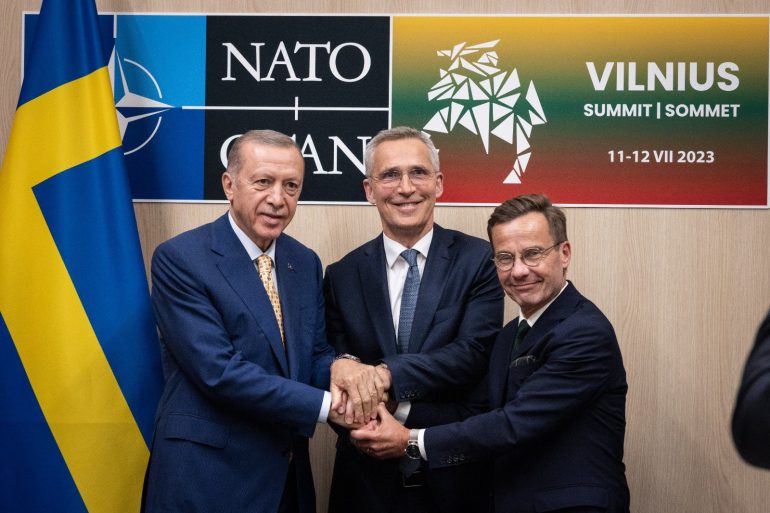Following his re-election in May, Turkey’s President Recep Tayyip Erdogan has made a surprising policy reversal by supporting Sweden’s Nato accession, symbolizing a shift towards Western re-alignment. After a year of delay, Erdogan agreed on Monday to allow Sweden to become the 32nd member of the US-led defense alliance.
Erdogan’s shift followed his unexpected demand for a clear path for Turkey’s stagnant European Union membership bid. This requirement led to a private meeting with EU chief Charles Michel, followed by a pledge from Sweden and Nato to “support efforts to revitalize Turkey’s EU accession process”.
The accord allows Nato to present a unified front at the two-day summit that started Tuesday in Vilnius, primarily intended to show Western unity against Russia’s aggression in Ukraine. However, the deal also signifies a strategic shift in Ankara’s thinking after Erdogan almost lost his two-decade reign in the May elections.
Erdogan, faced with a severe economic crisis during the election period, tried to stabilize the situation through agreements with wealthy Gulf countries and, alarmingly to the West, Russian President Vladimir Putin. Erdogan’s inflexibility over Sweden’s Nato membership fueled the perception that Nato member Turkey was becoming a tool for Kremlin to incite discord in the West.
That image began to alter after Erdogan consulted Wall Street-trained economists seeking to enhance relations with Western investors after the election. Erdogan further stirred the waters by having an extensive meeting with Ukrainian President Volodymyr Zelensky, which caused unease in Moscow.
The Sweden deal came after a call with US President Joe Biden, in which Erdogan discussed both EU accession and Turkey’s desire to acquire a significant number of F-16 fighter jets.
As Asli Aydintasbas, analyst at the European Council of Foreign Relations, observed, “Ankara wants to improve its relations with Europe and the West. The recent policy balance had tilted too much towards Russia.”
Transactionalism
For a long time, Erdogan has been known for exploiting Turkey’s strategic position between Europe and Asia to balance Russian and Western interests for maximum advantage. Few expect his recent shift towards the West to be a significant or enduring change.

“Most people see Erdogan as unpredictable, but that’s not entirely accurate,” said seasoned Turkish analyst Salim Cevik. “If you understand his transactional style, he’s quite predictable.”
Observers note that Erdogan’s change in tactics came after a June rebellion by Wagner mercenaries group leader Yevgeny Prigozhin caused chaos in Moscow, leaving Putin looking vulnerable. Erdogan concluded his meeting with Ukrainian President Zelensky by expressing support for Ukraine’s Nato ambitions and approving a deal that could supply Kyiv with more Turkish combat drones.
However, Russia’s most vocal outrage followed the return of five Ukrainian commanders to Kyiv from Turkey, who were accompanying Zelensky. These fighters from the Avov regiment became national heroes in Ukraine due to their staunch defense of Mariupol—now under Russian control—in the initial months of the war. Under an agreement facilitated by Erdogan in September 2022, they were supposed to remain in Turkey until the war’s end.
Kremlin spokesperson Dmitry Peskov stated on Monday that Russia “expects to receive explanations from the Turkish side about what happened.” He added, “We will take this into account in our future agreements.”
Damaged goods
Timothy Ash, a long-time observer of Russia and Turkey, partially attributes Erdogan’s shift to the Wagener rebellion. “The Azov and drone deals over the weekend around the Zelensky visit showed that Turkey believes, post the Prigozhin mutiny, that Ukraine will triumph and Putin is damaged goods, likely on his way out,” Ash stated.
However, Turkey’s membership in the European Union still seems like a remote possibility. Erdogan’s balancing act will probably continue for the remaining five years of his presidency. Days after the Nato summit, Erdogan has planned a fundraising trip to Saudi Arabia and two other petroleum-rich Gulf nations.
European powers such as France have longstanding doubts about accepting Turkey, a predominantly Muslim country, into the bloc. In 2019, the European Parliament voted to halt negotiations with Ankara due to perceived regression on democratic values and human rights under Erdogan’s leadership. Turkey has been a formal candidate for EU membership since 2005.
“Turkey needs Western investments, but I don’t think they’ll come just because the president has changed his rhetoric,” said Nilgun Arisan Eralp, an analyst at Turkey’s TEPAV policy institute. “Investors want to see an economy based on the rule of law.”
AFP


